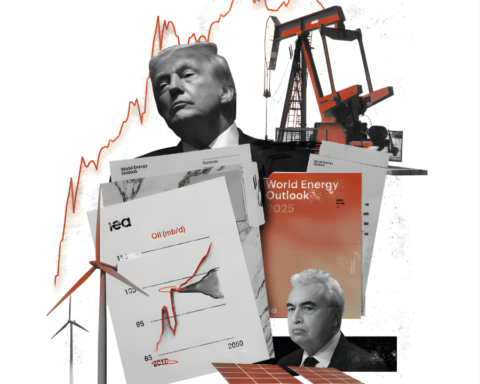The energy industry is one of the least accessible industries for women in the country. In 2018, Canada’s mining, quarrying, and oil and gas extraction sectors were among the largest drivers behind the national wage gap, responsible for 6.7% of the discrepancy between men and women, according to Statistics Canada.
But in Alberta in particular, unequal pay is just one of many barriers faced by women interested in entering or currently working in the energy sector – and it’s time for energy companies to start doing something about it.
After an extensive review of all available resources on gender inequities in the workplace and consultations with experts in the field, our team of researchers at the Pembina Institute found that there are at least five major barriers to women’s participation and leadership in Alberta’s energy sector. In addition to the wage gap and an industry-wide culture that promotes gender bias, barriers include a lack of access to opportunities (such as networking, job offers and internships), a lack of jobs that provide features women value (such as flexible hours and childcare support), and limited or no opportunities for advancement.
The compounding barriers make Alberta’s energy industry one of the most gender-inequitable sectors in the country.
While conducting our research, we came to a stark realization that data on gender equity in Alberta’s energy industry is scarce. There is little publicly available information about the sector’s gender wage gap, rates of representation, and rates of workplace harassment and violence.
The data that we could find primarily reflected gender discrepancies at the national or international levels. For example, a 2019 report by the International Renewable Energy Agency found that on a global scale, renewable energy employs a slightly higher percentage of women (32%) than the energy sector overall (22%). This statistic, unfortunately, tells us very little about the status of representation in Canada or Alberta specifically. And as policy researchers, it is nearly impossible to provide evidence-based advice to the industry in the absence of this information.
It’s common for Alberta’s energy companies to report data on salaries or their percentage of part-time workers, but this information is rarely disaggregated by gender. Yet we do know that in Alberta’s wider workforce, women are almost three times as likely as men to work part-time. Separating data by gender lets us see the experiential differences between genders, identify industry trends and develop tailored, effective solutions to problems.
Across all energy sectors, data on the experiences of women with identities that may put them at additional disadvantages in the workforce (such as being Indigenous, disabled or LGBTQIA2S+) is also sparse. Missing altogether is robust, industry-reported data on violence and harassment in the workplace, which is severely underreported. Most survivors of reported sexual violence are women, and the odds of survivors reporting sexual violence is 80% lower than for other violent crimes. Emerging data show this issue is significantly worse for Indigenous women, who, according to Statistics Canada, more frequently report sexual harassment than non-Indigenous women.
Corporate leadership on gender equity in energy starts with collecting and sharing quality data
But there are opportunities to change this outlook. The energy sector is already transforming rapidly in response to the climate crisis. Changes that were once thought impossible – for example, a coalition of Alberta’s major oil and gas producers pledging net-zero emissions – are now taking place. The sector can, and should, take on sweeping changes to advance sector-wide gender equity.
As energy companies look to build environmental, social and governance (ESG) policy platforms, better and more transparent reporting, especially of gender-disaggregated data, is a key starting point.
Over the past year, I have participated in many forums for women in the energy sector to share their stories. Something that has become clear from these conversations is that rates of harassment and violence in the energy industry are significantly higher than what the available data suggests. In the void of transparent industry-led reporting, information circulates in these informal venues – helping some, but certainly not all, women. Many aspects of rampant gender inequities and gender-based abuses still fly under the radar.
Women trying to enter or succeed in this industry also struggle to advocate for themselves and have their concerns taken seriously. Good gender-disaggregated data can help change that.
The Pembina Institute is currently engaging with hundreds of women across Alberta and Canada to hear their recommendations on the changes needed in the workplace and the energy sector in general. In 2022, we will publish a report based on the feedback we’ve received, and will use it to advocate for gender equity improvements in the energy sector.
In the meantime, we’re calling on Alberta’s energy companies to implement systems to gather and report gender-based data so we can break down some of the barriers that have made the sector one of the least accessible industries for women in the province, if not the country. An excellent guide for companies to turn to is the Blueprint for Gender Equality Leadership in the Canadian Private Sector. Without industry-led reporting and action, the task of solving issues around gender equity will continue to fall to the women who volunteer to share their stories and put forward actionable directives – a system unlikely to create the internal changes companies need to make.
Laura Hughes is a senior analyst with the Pembina Institute based in Calgary. She leads Pembina’s gender equity work, researching and engaging with women across Alberta’s energy sector.







